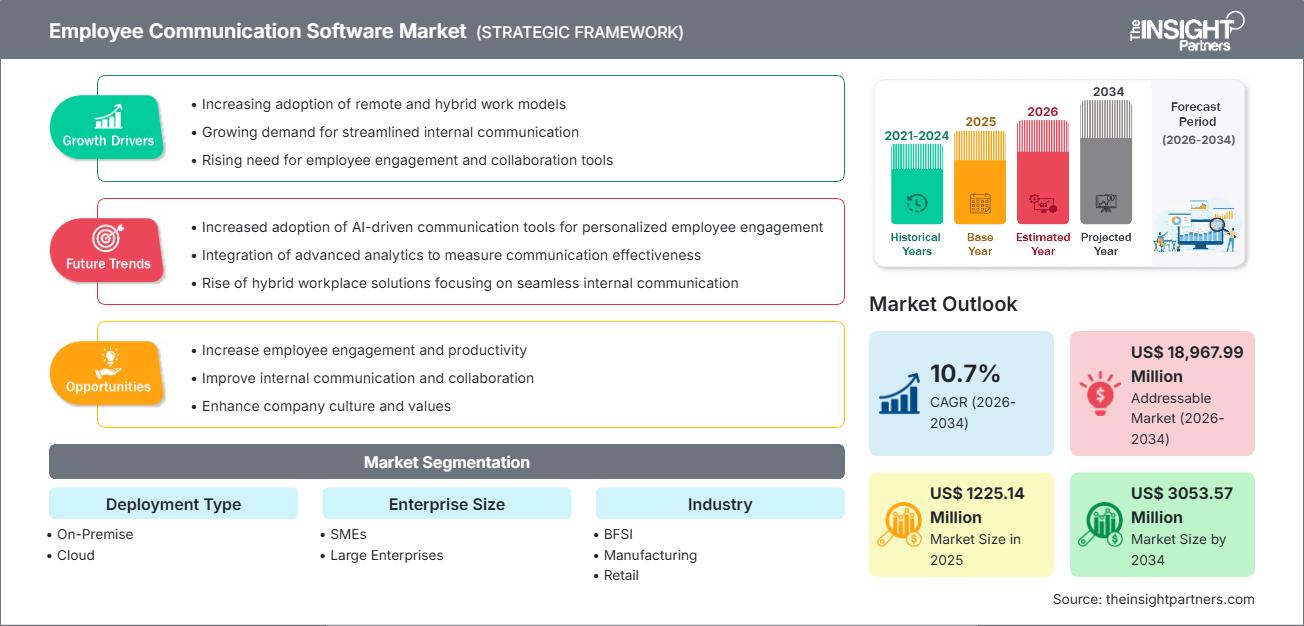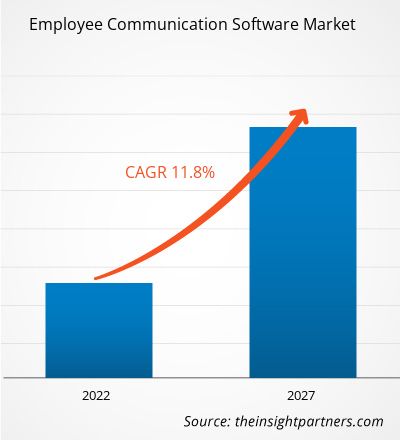Der Markt für Software zur Mitarbeiterkommunikation wird voraussichtlich von 1225,14 Millionen US-Dollar im Jahr 2025 auf 3053,57 Millionen US-Dollar im Jahr 2034 wachsen. Es wird erwartet, dass der Markt im Prognosezeitraum 2026–2034 eine durchschnittliche jährliche Wachstumsrate (CAGR) von 10,7 % verzeichnen wird.
Marktanalyse für Software zur Mitarbeiterkommunikation
Der rasante Wandel hin zu Remote- und Hybridarbeitsmodellen treibt das Wachstum des Marktes für Software zur Mitarbeiterkommunikation an, da dadurch der Bedarf an leistungsstarken Lösungen für die interne Kommunikation gestiegen ist. Investitionen in die digitale Transformation des Arbeitsplatzes zur Verbesserung von Mitarbeiterengagement, Zusammenarbeit und Echtzeit-Feedback werden die Akzeptanz fördern – durch die Integration von KI, Automatisierung und fortschrittlicher Analytik zur Personalisierung der Kommunikation und zur Messung der Effektivität.
Marktübersicht für Software zur Mitarbeiterkommunikation
Nutzen Sie Daten und Analysen, um die Effektivität der Kommunikation zu messen und die interne Zusammenarbeit zu optimieren. Die Lösungen unterstützen Echtzeit-Messaging, Ankündigungen, Feedback, Umfragen und die Zusammenarbeit. ECS hilft Unternehmen jeder Größe – von kleinen und mittelständischen Betrieben bis hin zu Großunternehmen – die Kommunikation effektiv zu optimieren, die Zusammenarbeit zu verbessern und die Abstimmung zwischen verteilten Teams sicherzustellen.
Passen Sie diesen Bericht Ihren Anforderungen an.
Sie erhalten eine kostenlose Anpassung aller Berichte – einschließlich Teilen dieses Berichts, Länderanalysen und Excel-Datenpaketen – sowie attraktive Angebote und Rabatte für Start-ups und Universitäten.
Markt für Mitarbeiterkommunikationssoftware: Strategische Einblicke

-
Ermitteln Sie die wichtigsten Markttrends dieses Berichts.Diese KOSTENLOSE Probe beinhaltet eine Datenanalyse, die von Markttrends bis hin zu Schätzungen und Prognosen reicht.
Markttreiber und Chancen für Software zur Mitarbeiterkommunikation
Markttreiber:
- Die zunehmende Verbreitung von Remote- und Hybridarbeit erfordert eine reibungslose interne Kommunikation.
- Wachsende Nachfrage nach Tools für Mitarbeiterengagement und Zusammenarbeit.
- Zunehmende Nutzung cloudbasierter Kommunikationsplattformen zur skalierbaren und flexiblen Unterstützung einer verteilten Belegschaft.
- Integration von KI, Automatisierung und fortschrittlicher Analytik zur Personalisierung der Kommunikation und Messung der Effektivität.
Gelegenheiten:
- Nutzen Sie Daten und Analysen, um die Effektivität der Kommunikation zu messen und die interne Zusammenarbeit zu optimieren.
- Nutzen Sie KI-gestützte Tools (Chatbots, intelligente Benachrichtigungen), um die routinemäßige interne Kommunikation zu automatisieren.
- Entwicklung mobiler Plattformen für Mitarbeiter ohne festen Arbeitsplatz oder im Außendienst, die zur Kommunikation auf Smartphones angewiesen sind.
- Erweitern Sie Ihr Geschäft in globalen Unternehmen durch mehrsprachigen Support, sichere Echtzeitkommunikation und Feedbackkanäle.
Marktsegmentierung für Software zur Mitarbeiterkommunikation
Nach Bereitstellungstyp:
- Vor Ort
- Wolke
Nach Unternehmensgröße:
- KMU (Kleine und mittlere Unternehmen)
- Großunternehmen
Nach Branchen:
- BFSI
- Herstellung
- Einzelhandel
- Gesundheitspflege
- IT & Telekommunikation
- Andere Branchen
Nach Geographie:
- Nordamerika
- Europa
- Asien-Pazifik
- Süd- und Mittelamerika
- Naher Osten und Afrika
Markt für Software zur Mitarbeiterkommunikation: Regionale Einblicke
Die regionalen Trends und Einflussfaktoren auf den Markt für Mitarbeiterkommunikationssoftware im gesamten Prognosezeitraum wurden von den Analysten von The Insight Partners ausführlich erläutert. Dieser Abschnitt behandelt außerdem die Marktsegmente und die geografische Verteilung des Marktes für Mitarbeiterkommunikationssoftware in Nordamerika, Europa, Asien-Pazifik, dem Nahen Osten und Afrika sowie Süd- und Mittelamerika.
Umfang des Marktberichts zu Software für die Mitarbeiterkommunikation
| Berichtattribute | Details |
|---|---|
| Marktgröße im Jahr 2025 | 1225,14 Millionen US-Dollar |
| Marktgröße bis 2034 | 3053,57 Millionen US-Dollar |
| Globale durchschnittliche jährliche Wachstumsrate (2026 - 2034) | 10,7 % |
| Historische Daten | 2021-2024 |
| Prognosezeitraum | 2026–2034 |
| Abgedeckte Segmente |
Nach Bereitstellungstyp
|
| Abgedeckte Regionen und Länder |
Nordamerika
|
| Marktführer und wichtige Unternehmensprofile |
|
Marktdichte der Anbieter von Software für die Mitarbeiterkommunikation: Auswirkungen auf die Geschäftsdynamik verstehen
Der Markt für Software zur Mitarbeiterkommunikation wächst rasant, angetrieben durch die steigende Nachfrage der Endnutzer. Gründe hierfür sind unter anderem sich wandelnde Verbraucherpräferenzen, technologische Fortschritte und ein wachsendes Bewusstsein für die Vorteile der Produkte. Mit steigender Nachfrage erweitern Unternehmen ihr Angebot, entwickeln innovative Lösungen, um den Kundenbedürfnissen gerecht zu werden, und nutzen neue Trends, was das Marktwachstum zusätzlich beflügelt.

- Verschaffen Sie sich einen Überblick über die wichtigsten Akteure im Markt für Mitarbeiterkommunikationssoftware.
Marktanteilsanalyse für Mitarbeiterkommunikationssoftware nach Regionen
- Nordamerika: Historisch gesehen dominant, bedingt durch die frühe Einführung digitaler Arbeitsplätze, eine starke technologische Infrastruktur und große Unternehmen.
- Europa: Steigende Nachfrage aufgrund von regulatorischen Vorgaben, digitaler Transformation und Fokus auf das Mitarbeitererlebnis.
- Asien-Pazifik: Diese Region birgt aufgrund der zunehmenden Fernarbeit, des Wachstums von KMU und der wachsenden Nutzung von Cloud-Lösungen ein hohes Potenzial.
- Süd- und Mittelamerika sowie Naher Osten und Afrika: Zunehmende Akzeptanz, vor allem bei Unternehmen, die in digitale Transformation und interne Kommunikationsplattformen investieren.
Marktdichte der Anbieter von Software für die Mitarbeiterkommunikation: Auswirkungen auf die Geschäftsdynamik verstehen
Der Markt für Enterprise-Service-Management-Systeme (ECS) zeichnet sich durch einen Mix aus spezialisierten Anbietern von Kommunikationsplattformen, Unternehmenssoftwarefirmen und Anbietern von HR-Tools aus. Der Wettbewerb verschärft sich aufgrund folgender Faktoren:
- Nachfrage nach nahtloser Integration mit HR-Systemen, Kollaborationstools und Feedback-Plattformen.
- Differenzierung durch KI-gestützte Interaktion, Analysen und intelligente Benachrichtigungsfunktionen.
- Skalierbarkeit und Flexibilität durch Cloud-First-Architekturen.
- Sicherheit und Verschlüsselung gewährleisten, dass die interne Kommunikation sicher und gesetzeskonform abläuft.
Zu den wichtigsten Unternehmen, die auf dem Markt für Software zur Mitarbeiterkommunikation tätig sind, gehören:
- Imker AG
- Nudge Corporation
- Poppulo
- Simplr Inc.
- Smarp Oy
- SnapComms Inc.
- Sociabble, Inc.
- Staffbase
- die Mitarbeiter-App
Weitere im Rahmen der Studie analysierte Unternehmen:
- StaffHub-Lösungen
- Connectteam Inc.
- Workvivo
- Happeo
- BlinkApp
- Zoho Connect
- Jive Software (Ein Unternehmen der Aurea-Gruppe)
- Foko Retail
- Oktopost
Neuigkeiten und aktuelle Entwicklungen auf dem Markt für Software zur Mitarbeiterkommunikation
- Zunehmende Integration KI-gestützter Funktionen (intelligente Benachrichtigungen, Chatbots) in Mitarbeiterkommunikationsplattformen zur Steigerung des Engagements und zur Reduzierung des manuellen Aufwands.
- Zunehmender Trend hin zu Cloud-basierten Lösungen, da Unternehmen ihre Infrastruktur für Remote- und Hybridarbeit ausbauen.
- Die Nutzung mobiler Kommunikationsplattformen, insbesondere für Mitarbeiter im Außendienst oder ohne festen Arbeitsplatz, ermöglicht die Interaktion in Echtzeit unterwegs.
Marktbericht über Software für die Mitarbeiterkommunikation: Abdeckung und Ergebnisse
Der Bericht „Marktprognose für Software zur Mitarbeiterkommunikation bis 2027“ von The Insight Partners liefert folgende Informationen:
- Marktgröße und Prognose auf globaler, regionaler und Länderebene für alle wichtigen Segmente.
- Detaillierte Trends, Treiber, Hemmnisse und Wachstumschancen.
- PEST- und SWOT-Analysen des Marktes.
- Wettbewerbsumfeld, einschließlich Marktkonzentration, Heatmap-Analyse und wichtigsten Anbietern.
- Unternehmensprofile der wichtigsten Akteure auf dem ECS-Markt.
- Historische Analyse (2 Jahre), Basisjahr, Prognose (7 Jahre) mit CAGR
- PEST- und SWOT-Analyse
- Marktgröße Wert/Volumen – Global, Regional, Land
- Branchen- und Wettbewerbslandschaft
- Excel-Datensatz
Aktuelle Berichte
Erfahrungsberichte
Grund zum Kauf
- Fundierte Entscheidungsfindung
- Marktdynamik verstehen
- Wettbewerbsanalyse
- Kundeneinblicke
- Marktprognosen
- Risikominimierung
- Strategische Planung
- Investitionsbegründung
- Identifizierung neuer Märkte
- Verbesserung von Marketingstrategien
- Steigerung der Betriebseffizienz
- Anpassung an regulatorische Trends






















 Kostenlose Probe anfordern für - Markt für Software zur Mitarbeiterkommunikation
Kostenlose Probe anfordern für - Markt für Software zur Mitarbeiterkommunikation